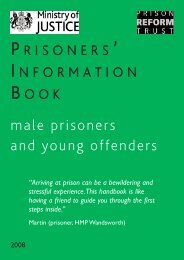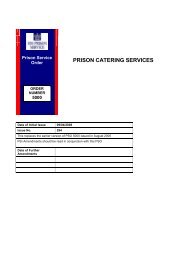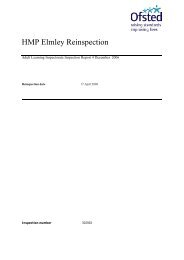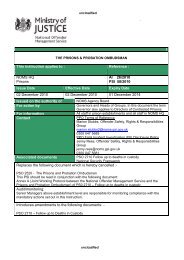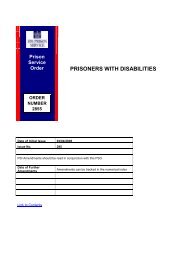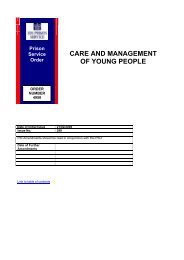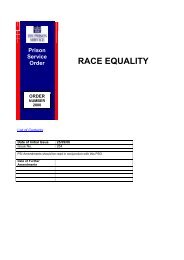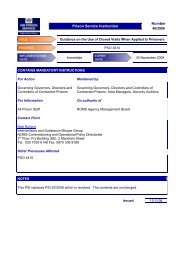PSO 4630 - Inside Time
PSO 4630 - Inside Time
PSO 4630 - Inside Time
- No tags were found...
Create successful ePaper yourself
Turn your PDF publications into a flip-book with our unique Google optimized e-Paper software.
<strong>PSO</strong> <strong>4630</strong> Page 46be deported. A failure to put forward any relevant material will not at this stage have aneffect on a later right of appeal.2. If the prisoner does not respond or, following consideration of the information put forwardby him, BIA decides to pursue deportation anyway, he is then served with a formal decisionnotice informing him of an intention to deport him to either the country of which he is anational or a country which last issued him with a travel document. Court recommendedcases receive this notice straight away. It is service of this document, which triggers theright of appeal against the decision to make a Deportation Order. At this stage, the prisoneris formally warned that he must now put forward all information he wants to be consideredas part of that appeal, and any failure to do so may disadvantage him at a later stage. Thisis known as the “One-Stop Appeal”. (see “Appeals”).AppealAppeals rights are complex and cannot be fully explained here. Some cases will have a right ofappeal before removal, some will only have a right of appeal after removal and others will have noright of appeal at all. Deportation cases generally have a right of appeal before removal against thedecision to make a Deportation Order, but whatever the case, the BIA decision notices will alwayscarefully explain what right of appeal the subject has, how he can appeal, any time limit attached tosubmitting an appeal, and where he may obtain assistance in completing the appeal and beingrepresented at any hearing.Where an appeal right exists, whether before or after removal, the prisoner is required to submit allinformation he wants to be considered at the time of hearing. A failure to do so, may lead to thenew information being disregarded.In deportation cases, the appeal must be lodged with the CCD. It passes the file to BIA‟s AppealProcessing Centre (APC), where all relevant papers are collated. The APC then refers the appealto the Asylum and Immigration Tribunal (AIT).The AIT is part of the Ministry of Justice, and like the judiciary, those who hear the appeals areindependent of the government. Most appeals are heard at one of its numerous courts sitedaround the country. An Immigration Judge will normally consider the appeal first; if it is dismissed,certain cases may seek a review of the dismissal by a higher court, or appeal to the Court ofAppeal and even the House of Lords.If the appeal is allowed by the Immigration Judge, the Home Office may equally be able tochallenge the decision, but if at the end of such action the decision to make a Deportation Order isoverturned, the prisoner may not on this occasion be deported.The Deportation OrderIf the prisoner does not appeal, or the courts rule that CCD is correct in seeking to deport him, thecaseworker completes a submission for the Chief Executive of the Border and Immigration Agencydetailing all the facts of the case and submits a Deportation Order for signature. DeportationOrders are normally returned to the caseworker by Private Office within 48 hours.The caseworker will then send the Deportation Order to an immigration officer for service, but insome cases they may be sent to the prison by fax for service. BIA ask that a copy of the Order issigned by the serving officer and dated before being faxed back to CCD. The prison officer is onlyacting as a postman and is entitled to serve the document on BIA‟s behalf.Once the deportation order has been served removal directions will be set (see “Removal” below).Issue No 287 Issue date 11/01/08





